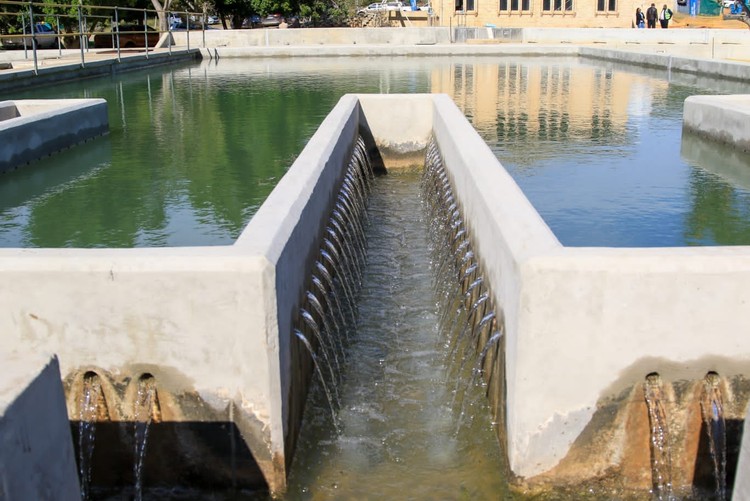Deadline for Makhanda water works upgrades missed – again
Completion of work at the James Kleynhans Water Treatment Works has been extended for the third time in six months
Makhanda’s water treatment works has been undergoing an upgrade since 2015, with completion deadlines having been extended since 2017. Photo: Loyiso Dyongman
- Makhanda, formerly Grahamstown, has been experiencing water shortages for more than a decade.
- Upgrades to double the output of the town’s water treatment works began in 2015 and were supposed to have been completed two years later.
- But completion deadlines are still being extended, seven years later.
Amatola Water has again missed the deadline for completion of the James Kleynhans Water Treatment Works (JKWTW) upgrades in Makhanda. This is the latest in a string of delays stretching back to 2017.
The project, initially budgeted at R102-million, started in 2015 and was meant to have been completed in December 2017. After numerous deadline extensions, the budget has ballooned to R393-million, according to implementing agent, Amatola Water.
The water service utility’s stakeholder manager Amanda Skritch on 7 April said the completion date has been pushed to the end of June. The April deadline which has now been missed, was itself revised from an earlier December 2023 completion deadline.
“The primary obstacle to the completion of the JKWTW project has been the contractor’s financial constraints, leading to delays,” said Skritch.
“Consequently, the revised practical completion date for the project culmination is now the end of June 2024. The project upgrades have not yet reached practical completion. However, efforts are underway to finalise the Phase 2 contract.”
She said the expanded budget of R393-million is not affected by the latest deadline extension, but did not say how much had already been spent.
Amatola Water was appointed as the implementing agent with Bosch Projects as consulting engineers to undertake the design and implementation of the upgrade, with funding from the Department of Water and Sanitation (DWS).
This phase 2 of the upgrade project would double the plant’s potable water output by providing an additional 10-million litres of water per day to Makhanda. The town currently uses 18-million litres of water per day, said Makana Local Municipality municipal manager Phumelelo Kate.
Mamlambo Construction Company, which was appointed by Amatola Water to do the upgrades, was liquidated in June 2022. At the time, Kate said Mamlambo was experiencing financial challenges and could not honour payments to local subcontractors. This led to unrest that delayed the project. A new contractor, Water and Wastewater Technology SA, was appointed on 25 November 2022.
Kate said the DWS was the project funder and directly pays Amatola Water, which in turn pays the contractor.
He said the 20-million litres of water per day that would be supplied once the upgrade is complete, would be enough for the entire town.
But former municipal councillor Philip Machanick says the revised completion dates have no credibility.
“Amatola Water Board should admit that they are not competent to implement such projects and ask the national government to appoint a competent implementation agency,” said Machanick. “I have lost track of the number of broken promises.”
He said on 16 August last year, the DWS minister promised the work would be completed by the end of that month, and promised he would return to the town in a month. “It is now over eight months later and we are told the end of June. We are yet to see the minister again,” said Machanick.
Meanwhile, Makhanda has been experiencing water outages and water shedding, for years.
Support independent journalism
Donate using Payfast

Don't miss out on the latest news
We respect your privacy, and promise we won't spam you.
© 2024 GroundUp. This article is licensed under a Creative Commons Attribution-NoDerivatives 4.0 International License.
You may republish this article, so long as you credit the authors and GroundUp, and do not change the text. Please include a link back to the original article.
We put an invisible pixel in the article so that we can count traffic to republishers. All analytics tools are solely on our servers. We do not give our logs to any third party. Logs are deleted after two weeks. We do not use any IP address identifying information except to count regional traffic. We are solely interested in counting hits, not tracking users. If you republish, please do not delete the invisible pixel.

